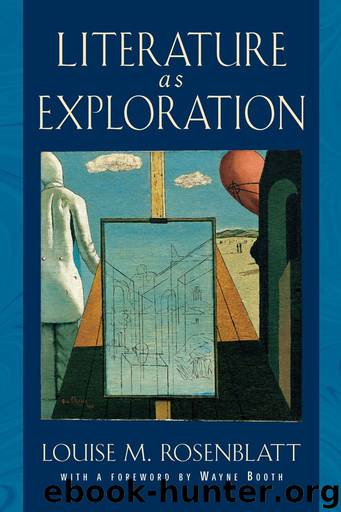Literature as Exploration by Rosenblatt Louise M

Author:Rosenblatt, Louise M. [Rosenblatt, Louise M.]
Language: eng
Format: epub
Publisher: The Modern Language Association of America
Published: 2016-07-31T16:00:00+00:00
CHAPTER 7
Personality
Literary materials—the poem, the short story, the novel, the drama, and, by extension, the motion picture and television—can contribute powerfully to both phases of the twofold educational process that we have outlined. Contemporary psychology encourages the belief that “the really important things in the education of youth cannot be taught in the formal didactic manner; they are things which are experienced, absorbed, accepted, incorporated into the personality through emotional and esthetic experiences” (Frank 214).
Of all the elements that enter into the educational process—except, of course, the actual personal relationships and activities that make up the community life of the school—literature possesses the greatest potential for that kind of assimilation of ideas and attitudes. For literature enables the youth to live through—and to reflect on—much that in abstract terms would be meaningless to him. He comes to know intimately, more intimately perhaps than would be possible in actual life, many personalities. He vicariously shares their struggles and perplexities and achievements. He becomes a part of strange environments, or he sees with new emotions the conditions and the lives about him. And these vicarious experiences have at least something of the warmth and color and immediacy of life.
Any insight or clarification the youth derives from the literary work will grow out of its relevance to certain facets of his emotional or intellectual nature. The whole personality tends to become involved in the literary experience. That a literary work may bring into play and be related to profoundly personal needs and preoccupations makes it a powerful potential educational force. For it is out of these basic needs and attitudes that behavior springs. Hence, literature can foster the linkage between intellectual perception and emotional drive that is essential to any vital learning process.
The criterion for judging the success of any educational process must be its effect on the actual life of the student; its ultimate value depends on its assimilation into the vary marrow of personality. What, then, are the results in terms of personality and behavior to be expected from the kind of literary experience and training that has been defined as desirable?
This question will be answered first in the light of the individual student’s relation to books. The present chapter will thus deal with the potential influence on personality inherent in literary experiences themselves. Chapter 8 will then apply this question to the type of literature study outlined in the first half of this book. Both of these chapters will reflect the view of personality development sketched in the preceding chapter and will indicate how an awareness of the suggested approach to human relations may grow out of the experience and study of literature.
We are now venturing on ground that is thorny with unexplored difficulties. Much emotion has been expended on this problem of the influence of literature, but little careful or controlled study has been made of it. The following discussion is offered principally for the purpose of focusing attention on this extremely important problem. The aim is to arouse
Download
This site does not store any files on its server. We only index and link to content provided by other sites. Please contact the content providers to delete copyright contents if any and email us, we'll remove relevant links or contents immediately.
| Books & Reading | Comparative Literature |
| Criticism & Theory | Genres & Styles |
| Movements & Periods | Reference |
| Regional & Cultural | Women Authors |
4 3 2 1: A Novel by Paul Auster(12396)
The handmaid's tale by Margaret Atwood(7770)
Giovanni's Room by James Baldwin(7350)
Big Magic: Creative Living Beyond Fear by Elizabeth Gilbert(5778)
Asking the Right Questions: A Guide to Critical Thinking by M. Neil Browne & Stuart M. Keeley(5778)
Ego Is the Enemy by Ryan Holiday(5453)
The Body: A Guide for Occupants by Bill Bryson(5100)
On Writing A Memoir of the Craft by Stephen King(4947)
Ken Follett - World without end by Ken Follett(4737)
Adulting by Kelly Williams Brown(4579)
Bluets by Maggie Nelson(4561)
Eat That Frog! by Brian Tracy(4543)
Guilty Pleasures by Laurell K Hamilton(4451)
The Poetry of Pablo Neruda by Pablo Neruda(4112)
Alive: The Story of the Andes Survivors by Piers Paul Read(4035)
White Noise - A Novel by Don DeLillo(4014)
Fingerprints of the Gods by Graham Hancock(4006)
The Book of Joy by Dalai Lama(3989)
The Bookshop by Penelope Fitzgerald(3855)
